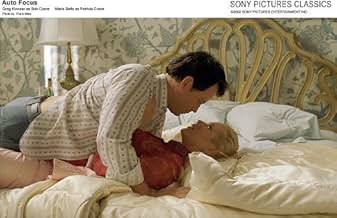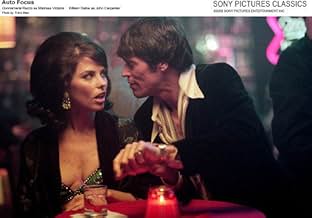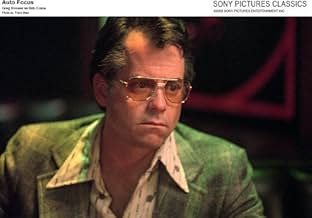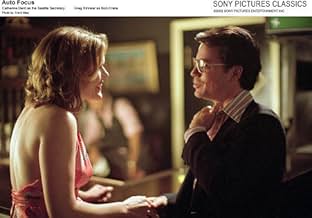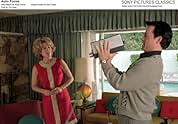A partir da história de vida movimentada e da morte misteriosa do ator Bob Crane (Greg Kinnear) o filme traça um retrato da identidade sexual masculina nos anos 1960 e 70.A partir da história de vida movimentada e da morte misteriosa do ator Bob Crane (Greg Kinnear) o filme traça um retrato da identidade sexual masculina nos anos 1960 e 70.A partir da história de vida movimentada e da morte misteriosa do ator Bob Crane (Greg Kinnear) o filme traça um retrato da identidade sexual masculina nos anos 1960 e 70.
- Direção
- Roteiristas
- Artistas
- Prêmios
- 6 indicações no total
- Richard Dawson
- (as Michael Rodgers)
- Melissa
- (as Donnamarie Recco)
- …
- Direção
- Roteiristas
- Elenco e equipe completos
- Produção, bilheteria e muito mais no IMDbPro
Avaliações em destaque
Greg Kinnear taps into Bob Crane, though, from the first frame.
The viewer learns that the pre-Hogan Crane was an affable, lovable kind of guy whose LA radio show had a big following. His agent sees him as a combination of Jack Lemmon and Jack Benny, a potential star of fluffy sex comedies with a benign sort of sex appeal and a knack for snappy one-liners All of that was a vast overestimation of Crane's talents.
Crane reveled in the fame that "Hogan" brought him, but he seems never to have taken a long view of his career. When the show ended he was left rudderless and idle, having slowly cut the ties that bound him to ordinary life -- his work, a stable home life, and his religious faith.
While he coasted, Crane took advantage of the easy, cynical charm he conveyed on screen to lure women. By the dozen. I think he probably enjoyed being the least likely man in Hollywood to skulk strip clubs looking for prey, and to devote thousands of yards of videotape to his exploits with them. But his naivete is telling: Crane allows himself to be led into a netherworld by John Carpenter, (Willem Dafoe), who teaches him that putting sex on film is more fun than having it. And there is a brief scene where Crane meets a dominatrix and reveals himself as not quite savvy enough to play this game to win.
Addictions tend to claim those who are on the way up or the way down. Even before Peg Entwistle famously jumped off the Hollywoodland sign in 1922, there have been scores of aspirants to fame or has-beens whose compulsions have killed them, leaving their work on screen the least compelling,least-remembered part of their lives.
The film follows the sexual exploits of Greg Kinnear as Bob Crane, the real-life star of Hogan's Heroes, who during and after the show became a full-blown sex addict, ruining two marriages and possibly sabotaging his career in the process. Willem Dafoe is John Carpenter (no, I know what you're thinking, and he's not), Crane's partner in crime who lacks Crane's charisma with women but is fed some scraps by Crane in return for his extensive knowledge of and access to video equipment. Crane's fetish is using the home video cameras to record his sexual trysts, which he reviews over and over again, looking for something that we can't see, and that he probably can't see either.
Kinnear and Dafoe's performances alone are worth the price of admission. This is the best, boldest, and most nuanced work that Kinnear has ever done. His performance is all subtlety and detail; he introduces Crane as a regular, aw shucks family man, but as the movie progresses we gradually see the facade fall as his quiet desperation and insatiable sexual appetite begin to consume him. Not content to go over the top and yell at the top of his lungs to be effective, Kinnear instead puts on a fake smile and charms with a velvety voice while openly degrading and hitting on women. The effect is one of the most genuinely creepy performances ever committed to film. Dafoe is the perfect companion to Kinnear's subtle predator; Carpenter is a pathetic loser, easily angered and easily hurt. He gets angry, yells, and does all of the things that you've seen Dafoe do in his other portrayals of guys you wouldn't want to meet in a dark alley, or a lighted one, for that matter. It's effective elsewhere, and it's effective here. Together, these men form a pair so utterly joyless and shallow that just seeing them on-screen together made my stomach churn. Their dialogue is only incidental, usually reminiscing on previous sexual escapades or planning new ones, but it's the little tics, gestures, Kinnear's untouchable confidence foiled by Dafoe's insecurity, Kinnear's hidden hunger foiled by Dafoe's overt desperation, that give these scenes their resounding power.
Not to shortchange Schrader's direction, though, which as usual is right on target for the material. He begins in a brightly colored, idealized suburban landscape, filled with all of the usual imagery you'd expect in this sort of light-hearted period and location. Then, slowly, he slides into darker territory, carrying us into the decadent seventies, breaking shots into shorter lengths, shaking the camera, depicting with his cinematography and editing the fall of his protagonist. Admittedly, the techniques Schrader employs here to depict Crane's breakdown have been used many times before, but I still found them extremely effective here.
For the last thirty minutes of the film, I felt genuinely ill; not because I thought the projector was out of focus, as many have complained, but because Schrader and Kinnear were taking me to a dark place and immersing me in it. As I said before, this type of film is not for everybody, but for those interested in the dark side of man, this film is not to be missed. I think that at the very least, the merit of these depressing morality tales is that they provide an exact blueprint of the way not to live our lives. I suppose that showing Crane checking himself into therapy and dealing with his problems and utimately healing himself would be valuable as well, but it wouldn't make for a good film, or a true one. Some people argue against the very existence of this type of movie. My response to them is that in real life for every strong-willed person who solves their problems and triumphs over adversity, there is another loser who ultimately fails to deal with life and implodes upon their own insecurity and weakness. Until this changes, someone needs to continue making these films.
Greg Kinnear does very good as Crane, especially in the latter scenes of the film. I think the part of Bob Crane would be somewhat difficult to play. Crane's legendary status is caught up not in his career itself, but his life other "on camera" life. A life that ended with his bludgeoning death (by blows from a camera tripod.) in June, 1978, just two weeks before what would have been his 50th birthday. Wilhem Dafoe is even better as the creepy John "Carpie" Carpenter, a video salesman who Crane meets on the set of Hogan's Heroes. Virtually all the supporting cast is also quite good. Particularly good are Kurt Fuller as Werner Klemperer/Col. Klink and Rob Leibman, who plays Crane's agent who watches helplessly as Crane's career and personal life veer out of control and plummet.
Carpenter, an electronics expert, at the time worked for Sony, selling the new and expensive technology of videotape players to mostly celebrities or others wealthy enough to afford them. The movie takes the viewer through the mid-late 1960's as Crane and Carpenter, both sex addicts, videotape their seemingly every night exploits with women they pick up from night clubs. This is no problem for Crane who was handsome and famous. Carpenter was portrayed as a hanger-on, along for the ride, and taking Crane's "seconds." Crane, married with children is at first able to hide his double-life from his family, although his wife is suspicious of his roving eye.. As a sidebar, there are some interesting tidbits in the movie about the development of videotape in the 60's into the 70's. After the cancellation of Hogan's Heroes in 1971 and his expensive divorce (his wife found photographic evidence of his escapades), Crane's sex addition seemingly worsens. He remarries, this time to an actress who played Col Klink's secretary in the Hogan's Heroes who tells him his dalliances are okay with her. They have a son soon after they are married and even she grows weary of his being away so much with Carpenter.
The mood of the film is in the beginning almost light-hearted, almost campy at times. . As the film continues and as Crane's personal life steadily implodes, professional life goes on the decline, a sense of darkness and desperation engulf the film. This is reinforced superbly by the hues on screen and the background music. The symbiotic relationship between Crane and Carpenter are portrayed so convincingly. Crane needed Carpenter for his video expertise and Carpenter needed Crane for the access to women. It is stunning how cavalier Crane was about picking up women and taping his sex acts, with or without their consent.
Crane is portrayed as a nearly broke totally washed-up B or C grade celebrity at the time of his murder. This was not necessarily the case. Crane in fact had made a lot of guest appearances on television series and game shows in the early and mid-70's. He had been signed to star in an ABC Movie of the Week shortly before his murder. Crane also owned a portion of Hogan's Heroes, and had received a royalty check in 1977 of over $95,000. Doing dinner theater was more a choice he had made, and he was making amounts off dinner theater that rivaled his royalty checks. Not a fortune, but a very decent living, especially for that time. To be sure he was strained by having to support one but two families, plus his addiction. He was not the big star he was, but not in oblivion, either. Only so much can be covered in the film's 90 or so minute running time, but the notion that his professional life was in smithereens was a bit misleading. Yet, many in Hollywood knew about his exploits and it no doubt cost him in professional opportunities. There is debate on both sides whether or not Crane at the time of his murder was attempting to change his life.
Near the end it is clear Crane had grown tired of "Carpie" and had basically told him the friendship as they knew it was coming to an end. This was just a day or so before his murder. Carpenter was arrested and tried years later for the murder but acquitted. He died in 1998, and the case officially remains unsolved.
Paul Schrader (Taxi Driver) directs so well this lurid and unflinching story. The DVD has lots of extras, including 3 different commentaries. The first by Kinnear and Dafoe, is good. Schrader's commentary is best as it offers a lot of insight into how they were able to make a relatively low-budget picture ($7 million I recall) look like they easily spent twice that amount. There is a third commentary was by the screenplay writers that I found dull. The deleted scenes are worth watching. For those interested in the Crane murder and the "whodunit" aspect there is a 45 minute feature entitled "Murder in Scottsdale" loaded with interviews and archival footage. The movie is based on Robert Graysmith's The Murder of Bob Crane, which I found to be interesting reading.
A popular star of the hit series Hogan's Heroes, Crane was a sex addict who enjoyed videotaping his sexual encounters. His partner in this endeavor was video expert John Carpenter.
Crane was murdered while doing dinner theater in Arizona. John Carpenter was a suspect in the murder, as were others. Carpenter was ultimately brought to trial and acquitted. The crime scene had been sloppily handled, and by the time Carpenter was arrested years later, evidence was missing. Carpenter died four years after his trial. The film's point of view suggests he was indeed the killer.
Crane had told his son that Carpenter was a hanger-on and he was getting ready to dump him, which police felt was a good motive for anger leading to murder.
Paul Schrader does a good job of directing, and the performances are solid from Greg Kinnear and Willem Dafoe especially. I do have to say that Kurt Fuller, a favorite of mine, was absolutely fantastic as Werner Klemperer in his role of Colonel Klink - one would have thought he was Werner - the look, the accent, the mannerisms - perfect.
Schrader shows Crane's decline, using both music and atmosphere to create what became the empty life of a man looking for something that he could never find. The DVD has a documentary about the murder on it, and his daughter states when interviewed that Crane was a wonderful father, "very doting." A sad story of the double life of someone who lit up the TV screen in the '60s.
Você sabia?
- CuriosidadesThe leather jacket that Greg Kinnear wears while playing Bob Crane in the Guerra, Sombra e Água Fresca (1965) scenes of this movie is the one that the real Crane actually wore during the filming of that TV series. Crane's son Robert David Crane loaned the jacket to Kinnear for this movie. Prior to the original "Hogan's Heroes" show, Frank Sinatra wore this exact same jacket in O Expresso de Von Ryan (1965).
- Erros de gravaçãoThere is a glimpse of the famous Capitol Records building painted silver. At the time of the film, it was actually painted black to resemble a stack of records.
- Citações
Bob Crane: I think it's perfect for me. I mean, this character Hogan, he's quick on his toes, he's hip, he's a con artist. I don't wanna jinx it, but I think it's what I've been working toward my whole career!
Anne Crane: Really? You've been working towards a Holocaust comedy?
Bob Crane: Ann!
Anne Crane: What, Bob?
Bob Crane: Please, not in front of the children! They look up to me!
Anne Crane: They're small. They look up to everyone.
- Versões alternativasThe following deleted scenes appear on the DVD:
- Victoria finds Bob's body.
- Hogan's Heroes Montage
- Bob unloads drums and some dirty magazines fall out.
- Anne and Bob talking by the pool.
- Anne in the darkroom.
- ConexõesFeatured in Auto Focus: Featurette (2002)
- Trilhas sonorasSnap!
Written by Paul Schrader and Angelo Badalamenti
Performed by David Johansen (as Buster Poindexter)
Produced by Brian Koonin
Principais escolhas
- How long is Auto Focus?Fornecido pela Alexa
Detalhes
- Data de lançamento
- País de origem
- Central de atendimento oficial
- Idioma
- Também conhecido como
- Autofocus
- Locações de filme
- Empresas de produção
- Consulte mais créditos da empresa na IMDbPro
Bilheteria
- Orçamento
- US$ 7.000.000 (estimativa)
- Faturamento bruto nos EUA e Canadá
- US$ 2.063.196
- Fim de semana de estreia nos EUA e Canadá
- US$ 123.761
- 20 de out. de 2002
- Faturamento bruto mundial
- US$ 2.704.951
- Tempo de duração
- 1 h 45 min(105 min)
- Cor
- Mixagem de som
- Proporção
- 1.85 : 1







